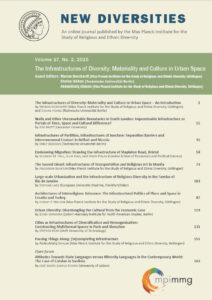Large-scale Urbanization and the Infrastructure of Religious Diversity in the Favelas of Rio de Janeiro
by Stephan Lanz (European University Viadrina, Frankfurt/Oder)
To cite this article: Lanz, S. (2015). Large-scale Urbanization and the Infrastructure of Religious Diversity in the Favelas of Rio de Janeiro. New Diversities, 17(2), 87–101. https://doi.org/10.58002/x6d9-d294
This article argues that the diversification of the religious landscape in the favela of Rio de Janeiro is closely linked with its historical and current governance constellations, the production and regulation of its infrastructures, and the materiality of its urban spaces. To this end, this study first lays out how the modes of regulation governing the favela and its infrastructures have developed historically in the dynamic interrelationship between residents, local actors, and state apparatuses. Using four adjoining favelas as an example, I analyze the religious transformation in recent decades as it is reflected in the history of the favelas as well as in the precarious nature of its infrastructure and socio-economic conditions. I suggest that the entrepreneurial self-made religion created by ordinary favela residents should be understood as an infrastructure, in the sense that it works as a platform that provides for and reproduces life in the favela. Finally, I will show that the authoritarian implementation of a large-scale public infrastructure program within this configuration not only further entrenches a historically developed power structure based on violence but also specifically curtails those religious infrastructures that the inhabitants have created themselves in accordance with their needs.
Keywords: Rio de Janeiro, favela urbanization program, pentecostalism
|
